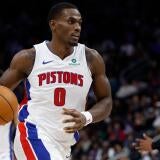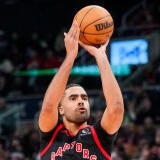
Where does the Minnesota Timberwolves' roster go from here?
With the Minnesota Timberwolves taking the first step in moving past the Kevin Love era, Flip Saunders now has to decide where to take this roster.

More Offseason Analysis: Coaching changes, news | Free Agency | Draft
The Kevin Love era with the Minnesota Timberwolves appears to have an end date of August 23 when a deal with the Cleveland Cavaliers is expected to go through. While there is still time for that to fall apart, the Wolves begin to have some clarity as to their existing roster and where their roster could be headed moving forward. Wolves' president of basketball operations, part owner, and coach Flip Saunders has the task of deciding how the Wolves decide to assemble their team moving forward.
The Wolves have two paths in which they can take: 1) they can attempt to be a competitive team while developing their young talent or 2) they can tear most of their roster down and do a full rebuild around Andrew Wiggins and their young guys.
Remaining competitive
Tearing it all down can be tricky because the Wolves have two long-term contracts in Nikola Pekovic and Kevin Martin. While Pekovic can still potentially be a tradable asset to a team looking for a low post scorer, the Martin deal will have to be coupled with an asset to unload it.
After the Love trade for Anthony Bennett, Andrew Wiggins, and Miami's 2015 first round pick, the Wolves' payroll will be around $64.2 million for this season. Pekovic has $47 million over four years left on his contract, Martin has $21.5 million over three years left on his deal, and Corey Brewer and Chase Budinger both have two years left for around $5 million each with the second year on both contracts being a player option. Minnesota also has expiring deals in J.J. Barea ($4.5 million), Alexey Shved ($3.2 million), and Luc Richard Mbah a Moute ($4.3 million).
Barea and Mbah a Moute seem very tradable because they can offer some salary cap relief. Budinger will be harder to deal because of his knee injuries over the past two seasons and Brewer's lack of consistency on both ends of the floor make him a little tricky as well. But if the Wolves can package two of those players with a pick or possibly even Anthony Bennett as a sweetener, they could potentially acquire Thaddeus Young from the 76ers. Young has two years left on his deal with $19.3 million owed to him, but he has an early termination option after the 2014-15 season.
Assuming the Wolves keep Glenn Robinson III (their second round pick they didn't sell), they'll be at 16 players on the roster after the Love trade. If they can't jettison off a couple players for one in exchange, they can either store Robinson in the D-League for the entire season while maintaining his draft rights or they can waive Robbie Hummel's one-year deal he just signed this offseason. Hummel's deal is fully guaranteed.
As the roster stands now, they have a depth chart of (educated guess on order):
Point guard: Ricky Rubio, Mo Williams, J.J. Barea
Shooting guard: Kevin Martin, Zach LaVine, Alexey Shved
Small forward: Andrew Wiggins, Corey Brewer, Chase Budinger, Shabazz Muhammad, Robbie Hummel, Glenn Robinson III
Power forward: Anthony Bennett, Luc Richard Mbah a Moute
Center: Nikola Pekovic, Gorgui Dieng, Ronny Turiaf
Let's say they move Bennett and Barea to the Sixers for Young. That puts Young as the starting power forward and Shved probably moves to being the third backup point guard. That would be the Wolves' core to challenge for a playoff spot in the West. With their best roster in a decade, they won 40 games last season and still missed the playoffs by nine games. To think they lost their best player and would still challenge in a more competitive West seems naive.
Moving forward, it would be easier to trade Brewer, Budinger, and Martin next summer, but their potential for cap space would be virtually eliminated with whatever contract extension they can work out with Rubio before this season starts. As long as they don't take on long-term deals, they can survive off of the "cheap" labor of rookie deals for Wiggins, Bennett, LaVine, and Dieng (combined to make $15.2 million in 2015-16) while they cull the markets for players to acquire in free agency or trades. But they currently wouldn't have a lot of flexibility unless they package a young player with a contract like Martin's.
Tear it all down
Let's say the Wolves want to unload the deals of Pekovic and Martin while keeping their young players and rebuilding with more picks in the draft. Finding a landing spot for Pekovic may not be terribly complicated if you're comfortable just getting his contract off the books and getting 40 cents on the dollar in return. With the rebuilding Celtics needing a moderately priced big man inside, the Wolves could send Pekovic and ask for Gerald Wallace, Kelly Olynyk, and a second round pick in return. The Celtics do this because they get a legitimate low post scorer on a contract that stays at $12.1 million over the next three seasons and falls to $11.6 million in the final year of the deal.
The Wolves do this because they get two years off of what they were paying Pekovic by assuming Wallace's deal that is through 2016, Olynyk who they coveted during the 2013 draft, and a second round pick they can sell off in the future.
Dealing Martin would be much harder unless they try to move him to the Knicks for Andrea Bargnani or something like that. They'd likely have to pair him with a protected pick or multiple second round picks along with an expiring contract. There really isn't much of a match for him so let's just assume they keep him. Let's also assume the Wolves extend Rubio for somewhere in the four-year, $50 million range.
The Wolves would have a core of Wiggins, Bennett, Dieng, and LaVine combined for $17.9 million heading into the summer of 2016. If they get Rubio somewhere in that $12.5 million per season range in his extension, you're looking at your core of those five players for $30.4 million. They also have their own first round pick over the next two years (as long as it's in the top 12) and they get Miami's pick in 2015 (as long as it's outside the top 10).
In the summer of 2016, the Wolves could have somewhere in the $25 million range for cap space (cap could be up around $70 million then so it could even be more than that) with a promising young core and three first round picks from 2015 and 2016 on their roster. They'd have Wallace, Budinger, Brewer, Barea, Mbah a Moute, and Shved all clearing about $32 million over the next two offseasons.
In a similar way the Utah Jazz have regrouped their core with a lot of cheap young players, the Wolves could be buyers in an attractive free agent market. At worst, they could be buyers in an attractive trade market with the teams that miss on the big free agents.
This is contingent on the Celtics being interested in Pekovic and making a deal like I stated above. A little patience, some player development, and a trade that unloads the Wolves' biggest contract in Pekovic could turn the Wolves from a cap-strapped bubble team a year ago to a promising young buyer ready to pounce on a market in 2016.
A lot has to go their way and the Wolves have a history of mismanaging most fork in the road situations. But they just got one of the best hauls for a superstar in the modern era of this Collective Bargaining Agreement. They may finally be entering an era of consistent competent decisions instead of their former way of doing business with their rosters.

















